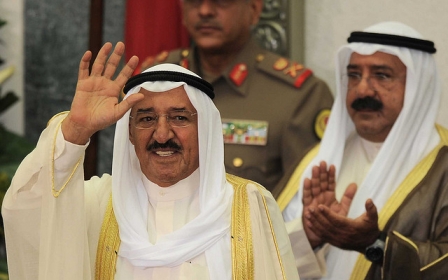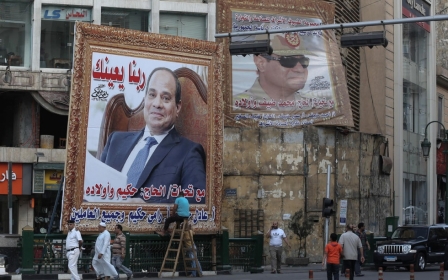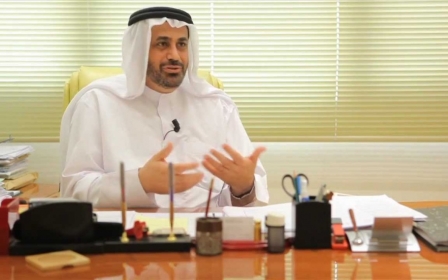Gulf-Iran ties unlikely to improve after Kuwait emir visit

A landmark visit by Kuwait's emir to the Iranian capital Tehran isn't likely to mend fences between Iran and Gulf Arabs, analysts said.
Sheikh Sabah al-Ahmad Al-Sabah, whose country currently heads the Gulf Cooperation Council (GCC) and the Arab summit, hopes his weekend visit of Tehran will turn over a new leaf in Iran-Gulf ties.
Iranian foreign minister Mohammad Javad Zarif said on Thursday that the emir's visit would open a new chapter in bilateral ties and pave the way for further expansion of relations and cooperation between the two countries.
This comes amid a thaw in relations between Iran and the Gulf states despite high tensions mainly over the conflict in Syria, where both sides accuse each other of military interference.
"Tehran's policies haven't changed... it has bolstered its military involvement in Syria and dispatched troops to support the regime against the people. It has also increased its interference in Iraq, Lebanon and Yemen," Riad Kahwaji, head of the Dubai-based Institute for Near East and Gulf Military Analysis, told AFP.
New MEE newsletter: Jerusalem Dispatch
Sign up to get the latest insights and analysis on Israel-Palestine, alongside Turkey Unpacked and other MEE newsletters
"Without a real change in Iran's policy on the ground, I don't think there will be any breakthrough in relations with Gulf Arab states. Nothing of this has happened," Kahwaji said.
Ahead of the emir's visit, his first as head of state, Kuwait expressed hope it would strengthen "security, stability and peace in the region".
In February, Kuwait's foreign ministry’s undersecretary Khaled al-Jarallah said his country was keen to further expand "excellent" relations with Tehran, describing Iran as a "friendly" and "important" state, which shoulders "big responsibilities" in the region.
'Centre of regional stability'
Last week, Iran's Fars news agency reported that Kuwait's emir described Iran as "the centre of regional stability" during a meeting with Tehran's new ambassador to Kuwait Alireza Enayati.
Kuwait, whose native population is one-third Shiite, has balanced ties with Tehran, even reportedly acting as a mediator to break the deadlock in the Islamic republic's relations with regional rival Riyadh.
For years, Iran's relations with the Gulf states have been frosty, but Tehran launched a diplomatic offensive aimed at easing these tensions since the election of self-declared moderate Hassan Rouhani as president in June 2013.
In December, Foreign Minister Mohammad Javad Zarif toured Kuwait, the United Arab Emirates, Oman and Qatar, but skipped Bahrain and Saudi Arabia.
Two weeks ago, however, his Saudi counterpart Prince Saud al-Faisal invited Zarif to visit, and Tehran welcomed the invitation without a date being set.
Additionally, on Thursday, Iran welcomed as a "friendly" gesture a Saudi invitation to a meeting of the Organisation of Islamic Cooperation next month in Jeddah, where Zarif may meet Prince Saud.
Last March, Rouhani himself visited Oman, which has maintained strong links with Iran and has mediated between the West and Tehran over its nuclear programme, and offered "a hand of fraternity to all the countries of the region".
While in Muscat, Rouhani stressed negotiations could resolve all differences, saying talks had helped end the deadlock in Iran's nuclear negotiations.
Gulf leaders welcomed an interim deal in December on Iran's nuclear programme but said concrete measures must follow.
'Positive signals'
Anwar Eshki, head of the Middle East Centre for Strategic Studies, said Iran appears to be serious in its efforts to mend ties, but also stressed deeds are needed.
"I think a good opportunity exists to improve Gulf-Iranian relations, including those between Tehran and Riyadh, provided that Iran takes practical steps in Syria and other places," Eshki told AFP.
"Rapprochement is possible now, and I think Iran is willing because its economy is deteriorating and popular demands are rising... Iran is currently reconsidering its policies," he said.
Eshki and Kahwaji agreed that unilateral contacts between some GCC states and Iran will not undermine the bloc's united strategy.
Kuwait's Al-Rai daily said the emir would speak to Iranian leaders on behalf of Gulf and Arab countries.
"The emir will tell them we want Tehran to respect the sovereignty of others, stop interfering in other countries' internal affairs and stop taking steps that may disrupt confidence with neighbours," it said in an editorial this week.
Meanwhile, the Editor-in-Chief of Kuwaiti newspaper the Arab Times, Ahmed Al-Jarallah, laid the responsibility for the visit's success squarely on the Iranian side.
"Undoubtedly, Iran has been sending positive signals to several capitals in the region and the entire world since Hassan Rouhani assumed office. However, he is yet to translate the signals into actions; especially in the region in a manner that could end concern of her neighbors towards provocative actions and interference in internal affairs," he said.
"Today, with the visit of the emir to the Iranian capital; Kuwait and other Arabian Gulf nations are expressing readiness to forget the past and open a new chapter," he added.
Middle East Eye delivers independent and unrivalled coverage and analysis of the Middle East, North Africa and beyond. To learn more about republishing this content and the associated fees, please fill out this form. More about MEE can be found here.




